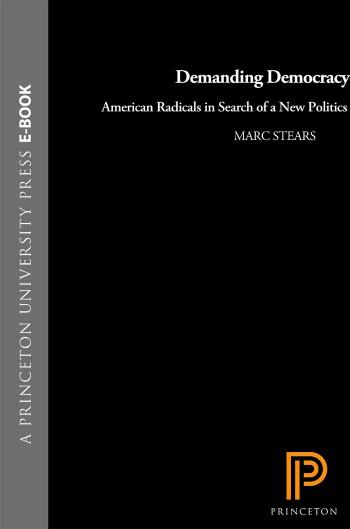Demanding Democracy: American Radicals in Search of a New Politics by Marc Stears

Author:Marc Stears [Stears, Marc]
Language: eng
Format: epub, pdf
Tags: Political Advocacy, History & Theory, United States, Modern, Political Ideologies, 20th Century, Political Science, Political Process, History, General
ISBN: 9780691157900
Google: DmmYDwAAQBAJ
Goodreads: 17130571
Publisher: Princeton University Press
Published: 2010-01-01T00:00:00+00:00
The Revival of American Radicalism
It often appeared that all that the new generation was left with was doubt: doubt about the place of certainty in politics, doubt about the possibilities of political action, and doubt about the capabilities of American citizens. And this doubt threatened the whole purpose of radicalism. As Judith Shklar put it, âradicalism is the belief that people can control and improve themselves and, collectively, their social environmentâ but one that âat present ⦠even those who regard themselves [as radicals] seem to lack.â39 No one, it seemed, was prepared to predict the future with any certainty or to insist that desirable political outcomes would necessarily follow from particular political strategies. Indeed, some commentators even expressed uncertainty as to whether American democracy as it currently existed could survive in the late twentieth century. The Soviet threat, the unsettling demands for ever greater economic prosperity, the ongoing war between capital and labor, the tensions between different ethnic groups, and the decreasing faith in the psychological capacities of citizensâall were considered potential causes of the unraveling of the American political order.40
All of this doubt provided deeply unpromising material for the shaping of a new radical democratic theory, yet that was the task that this generation set for themselves. However daunting they looked, these multiple expressions of doubt were not intended to obstruct but rather to assist with what Arthur Schlesinger called âthe revival of American radicalism.â41 Having accepted that all efforts to understand the social and political world were flawed, noted that politics was always likely to be corrupted by those âintoxicated by power,â and rid themselves of the belief that citizens were in any serious way âperfectible,â it was now necessary for self-identified radicals to build their theory up again by outlining a series of key principled commitments and concrete political practices that could survive such an onslaught. For all their pessimism, they had no intention of giving up entirely on the âimages of hope, human fraternity, and individual self-realizationâ that had characterized the greatest moments of previous generations.42 After all of the âheartbreakâ it was now time for radical democrats to return âto the basic principles of democracy.â43
The Cold War itself provided the backdrop for the first of those basic principles, which Schlesinger described as âthe affirmation of a belief in free society and an absolute repudiation of totalitarianism.â44 It was not just anti-Communism that justified this claim, however. The new generation of radical democrats were full-blown Pluralists whose primary commitment was to the inevitable diversity of human experience. Intellectually reared on the works of Harold Laski, Walter Lippmann, and Mary Follett, they shared the basic pluralist conviction that it was impossible to fully and accurately identify a substantial common good that bound all of Americaâs citizens together.45 We must âaccept a pluralistic destiny for mankind,â Schlesinger insisted. âFree men know many truths,â he continued, but no âmortal man knows The Truth,â both because the human intellect is too limited and because the truths of some individuals necessarily conflict with those of others.
Download
Demanding Democracy: American Radicals in Search of a New Politics by Marc Stears.pdf
This site does not store any files on its server. We only index and link to content provided by other sites. Please contact the content providers to delete copyright contents if any and email us, we'll remove relevant links or contents immediately.
| Anarchism | Communism & Socialism |
| Conservatism & Liberalism | Democracy |
| Fascism | Libertarianism |
| Nationalism | Radicalism |
| Utopian |
The Secret History by Donna Tartt(19088)
The Social Justice Warrior Handbook by Lisa De Pasquale(12190)
Thirteen Reasons Why by Jay Asher(8910)
This Is How You Lose Her by Junot Diaz(6887)
Weapons of Math Destruction by Cathy O'Neil(6280)
Zero to One by Peter Thiel(5802)
Beartown by Fredrik Backman(5754)
The Myth of the Strong Leader by Archie Brown(5508)
The Fire Next Time by James Baldwin(5446)
How Democracies Die by Steven Levitsky & Daniel Ziblatt(5219)
Promise Me, Dad by Joe Biden(5153)
Stone's Rules by Roger Stone(5088)
A Higher Loyalty: Truth, Lies, and Leadership by James Comey(4964)
100 Deadly Skills by Clint Emerson(4925)
Rise and Kill First by Ronen Bergman(4789)
Secrecy World by Jake Bernstein(4753)
The David Icke Guide to the Global Conspiracy (and how to end it) by David Icke(4720)
The Farm by Tom Rob Smith(4513)
The Doomsday Machine by Daniel Ellsberg(4490)
